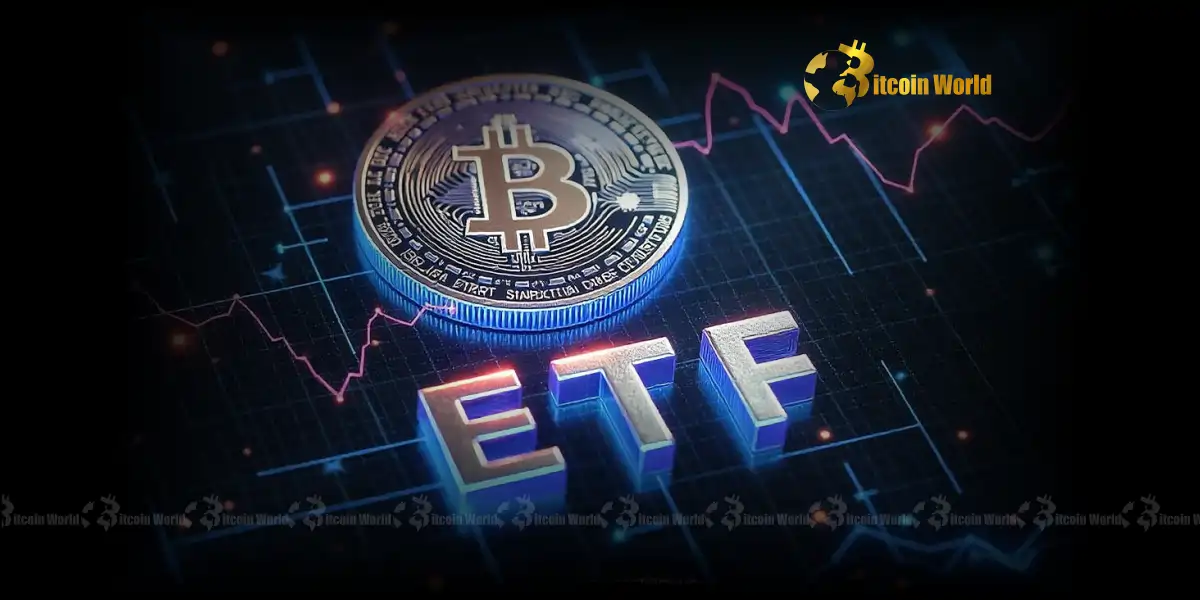BitcoinWorld

SEC Bitcoin ETF Delay: Understanding the Crucial Impact on In-kind Redemptions
The world of cryptocurrency ETFs is buzzing once again, but this time with a note of cautious anticipation. The U.S. Securities and Exchange Commission (SEC) has just announced a postponement of its decision regarding a significant aspect of the Bitwise Bitcoin ETF Trust and Bitwise Ethereum ETF: the allowance of ‘in-kind redemptions.’ This delay, reported by Decrypt based on a July 16 filing, keeps investors and market participants on the edge of their seats, wondering about the future trajectory of these highly anticipated investment vehicles. What does this mean for the burgeoning SEC Bitcoin ETF landscape and the broader digital asset market?
What Does the SEC Bitcoin ETF Delay Mean for Investors?
For those closely following the evolution of cryptocurrency investments, the recent move by the SEC is a familiar one – a delay, not a denial. The proposed rule change, which was submitted by NYSE Arca on May 21, aims to enable in-kind redemptions for Bitwise’s spot Bitcoin and Ethereum exchange-traded funds. While the initial approval of spot Bitcoin ETFs earlier this year was a monumental step, most currently operate under a ‘cash redemption’ model. The SEC’s decision to push back on the in-kind redemption model for the Bitwise ETFs signals a continued cautious approach to integrating digital assets into traditional finance.
This delay extends the review period, giving the regulatory body more time to deliberate on the complexities and potential implications of such a mechanism. For investors, it means that while the dream of a more efficient and potentially tax-friendly redemption process for these ETFs remains alive, its realization is still some way off. The market is now keenly watching for the SEC’s next move, understanding that each decision shapes the accessibility and operational dynamics of crypto-based financial products.
Unpacking In-kind Redemptions: Why the SEC is Hesitant
At the heart of the SEC’s deliberation lies the concept of In-kind Redemptions. But what exactly are they, and why are they such a focal point for regulators and issuers alike?
- What are In-kind Redemptions? In an in-kind redemption model, authorized participants (APs) exchange shares of an ETF directly for the underlying assets (in this case, Bitcoin or Ethereum) rather than cash. Conversely, for creation, APs would deliver BTC or ETH to the fund in exchange for new ETF shares.
- Benefits for Investors and Issuers: This method is generally considered more tax-efficient because it avoids the need for the fund to sell assets and incur capital gains, which could then be passed on to shareholders. It can also be more efficient for market makers, potentially leading to tighter spreads and lower costs for investors.
- SEC’s Concerns: The primary reason for the SEC’s hesitation revolves around investor protection and market integrity. Regulators are wary of potential market manipulation, custody risks associated with holding large amounts of volatile cryptocurrencies, and ensuring robust oversight mechanisms are in place. The direct handling of crypto assets by APs, rather than cash equivalents, introduces new layers of complexity and risk that the SEC is meticulously evaluating.
The current spot Bitcoin ETFs, including those from BlackRock and Fidelity, operate on a cash redemption model, where APs transact in cash to create or redeem shares. While functional, many in the industry believe in-kind redemptions offer a superior structure, aligning more closely with how traditional commodity and equity ETFs operate. The SEC’s extended review period for Bitwise underscores their deep dive into these nuanced operational differences and their potential systemic impact.
The Broader Impact on Ethereum ETF and the Crypto Market
While the immediate focus is on Bitwise’s specific filings, the SEC’s approach to in-kind redemptions has far-reaching implications, particularly for the anticipated Ethereum ETF landscape. The approval of spot Ethereum ETFs is still pending, and the SEC’s cautious stance on redemption mechanisms for Bitcoin ETFs will undoubtedly influence its decisions for Ether-based products.
If the SEC eventually approves in-kind redemptions for Bitcoin ETFs, it could set a precedent that smooths the path for similar structures in Ethereum ETFs. Conversely, continued delays or outright rejections could mean that all future spot crypto ETFs, including those for Ethereum, might be restricted to cash redemption models for the foreseeable future. This regulatory uncertainty can impact:
- Institutional Adoption: A more streamlined and tax-efficient in-kind redemption process could attract more institutional capital into the crypto space. Delays might deter some traditional finance players.
- Market Liquidity: In-kind redemptions can theoretically improve market liquidity by allowing APs to manage arbitrage opportunities more efficiently, directly interacting with the underlying crypto markets.
- Investor Confidence: Clear and consistent regulatory frameworks build investor confidence. Protracted delays, while understandable from a regulatory perspective, can sometimes foster uncertainty.
The broader Crypto ETF market is still in its nascent stages, and every regulatory decision, no matter how small it seems, contributes to shaping its long-term structure and growth potential. This specific delay highlights the SEC’s commitment to a methodical, albeit slow, integration of digital assets into the mainstream financial system.
Bitwise’s Position: A Pioneer in the Crypto ETF Race
Bitwise has consistently been at the forefront of bringing digital asset investment products to market. They were among the first to file for a spot Bitcoin ETF and have been vocal proponents of more efficient and investor-friendly structures, including in-kind redemptions. Their proactive approach demonstrates a commitment to innovation within the regulatory boundaries.
For Bitwise, this delay means a continuation of the waiting game. While they already have an operational spot Bitcoin ETF utilizing cash redemptions, securing approval for in-kind redemptions would offer them a competitive edge and potentially reduce operational complexities and costs. Their continued engagement with the SEC highlights the industry’s persistent efforts to refine and optimize crypto investment vehicles. This isn’t just about one company; it’s about pushing the entire industry forward towards more mature and integrated financial products.
Navigating Challenges and Seizing Opportunities in the Crypto ETF Landscape
The journey to fully integrated crypto ETFs is fraught with challenges, but also ripe with opportunities. The SEC’s delay on in-kind redemptions for the Bitwise Bitcoin ETF and Ethereum ETF underscores the regulatory hurdles that remain.
Challenges:
- Regulatory Scrutiny: The SEC’s primary mandate is investor protection and market integrity, leading to intense scrutiny of novel asset classes and redemption mechanisms.
- Market Volatility: The inherent volatility of cryptocurrencies presents unique challenges for fund management and risk assessment.
- Custody and Security: Ensuring the secure custody of digital assets is paramount, and the regulatory framework around this is still evolving.
Opportunities:
- Maturing Market: Each regulatory step, even a delayed one, contributes to the maturation and legitimization of the crypto market.
- Increased Access: ETFs provide an accessible entry point for traditional investors who may be hesitant to directly hold cryptocurrencies.
- Innovation: The ongoing dialogue between issuers and regulators fosters innovation in product design and operational efficiency, pushing the boundaries of financial technology.
Looking Ahead: What’s Next for Spot Crypto ETFs?
The SEC’s decision on in-kind redemptions for the Bitwise ETFs will undoubtedly set a precedent for future spot Crypto ETF products. While a definitive timeline remains elusive, market participants anticipate further engagement between issuers and the regulatory body.
It is plausible that the SEC may request more information, propose specific conditions, or even hold public forums to gather diverse perspectives before making a final determination. The path forward for crypto ETFs, particularly those seeking more advanced operational structures like in-kind redemptions, will likely involve continued adaptation and collaboration between innovators and regulators. The ultimate goal for many is a seamless integration of digital assets into the broader financial ecosystem, offering investors diverse, regulated, and efficient avenues to gain exposure to this transformative asset class.
Conclusion: Patience is a Virtue in the Crypto ETF Journey
The SEC’s postponement of its decision on in-kind redemptions for the Bitwise Bitcoin and Ethereum ETFs serves as a reminder that the journey of integrating cryptocurrencies into traditional financial products is a marathon, not a sprint. While the delay might be frustrating for some, it underscores the regulatory body’s commitment to a thorough and cautious approach, prioritizing investor protection and market stability above all else. The debate around In-kind Redemptions highlights critical operational and tax efficiency considerations that could significantly shape the future of these investment vehicles. As the industry continues to mature and regulatory clarity slowly emerges, patience remains a virtue for investors and innovators alike, eagerly awaiting the next chapter in the evolving story of SEC Bitcoin ETF and Ethereum ETF products.
To learn more about the latest crypto market trends, explore our article on key developments shaping Bitcoin and Ethereum institutional adoption.
This post SEC Bitcoin ETF Delay: Understanding the Crucial Impact on In-kind Redemptions first appeared on BitcoinWorld and is written by Editorial Team





